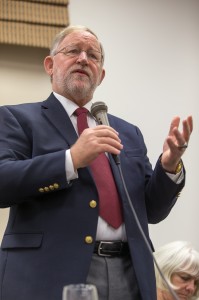Panelists discuss US security interests in the Middle East
On Monday morning, the Dornsife School of Letters, Arts and Sciences’ School of International Relations hosted a conversation on international security and business in the Middle East.

Middle East expertise · James B. Smith, the former U.S. ambassador to Saudi Arabia, discusses U.S. security interests in the Middle East. – Ralf Cheung | Daily Trojan
The panel featured Amer Kayani, Minister Counselor for Commercial Affairs for the U.S. Embassy in Saudi Arabia; Janet Breslin-Smith, former professor at the U.S. National War College; and James B. Smith, U.S. Ambassador to Saudi Arabia.
Kayani, who lives in Saudi Arabia and focuses on the Middle East’s economy as a part of his job, emphasized the parallels between economics within the Islamic religion and capitalism.
“Both [Islam and capitalism] permit private ownership of property, allow freedom of enterprise [and] support free markets in a competitive setting,” Kayani said.
Kayani noted that currently, governments in the Middle East have taken over these free markets and have been unable to keep up with the growing demand for jobs.
Anywhere from 50 to 70 percent of a Middle Eastern country’s population is 24 and under; this age group has recently graduated from college and is looking for jobs, which the government is unable to provide.
“Because state-owned enterprises have failed to create jobs, the leadership in these countries have come to realize that they need to open up the market … to allow small and medium-sized enterprises to come in and play an active role in job creation,” Kayani said.
Smith, who also lives in Saudi Arabia, noted the growing tension between ruling officials and upset citizens who cannot find jobs.
Smith noted that, for the first time in Saudi Arabian history, there are “self-forming groups of citizens” that can be seen coming together to help each other rather than relying on the government. He said one of the fears of ruling officials is that citizens will come together and form rebellions.
“The social contract in the region has always been one where the government provides and the population is thankful … but here we saw a different dynamic at work [in Jeddah November/December 2009],” Smith said.
Breslin-Smith, wife of Ambassador Smith and a USC alumna, talked about her experience living with Saudi Arabian women and learning what life “look[s] like from their point of view.”
Women in Saudi Arabia, though segregated from men due to Islamic tradition, are graduating at higher rates than men in the Middle East, and therefore are becoming a growing sector of the job market, said Breslin-Smith.
After college, approximately 70 percent of women are unemployed, and those that are employed tend to flock to online jobs they can do remotely, which allow them to remain segregated from men in their working environments.
From a business standpoint, Kayani noted that many industries are hiring only women workers, since women are unable to be seen in public during the day and therefore cannot take breaks to go outside, do not have obligations to take family members to appointments and are unable to drive during lunch breaks.
All three panelists agreed that the politics in the Middle East are “painfully slowly” changing as a result of unhappy populations who are becoming more educated and receiving less help from their governments.
Students found the panel to be vibrant in its discussion of the Middle East.
“I thought it was very informative,” said Mina Rizk, a senior double majoring in Middle Eastern studies and political science. “[Smith] had a couple of good points that I myself didn’t agree with, but I’m sure he knows more than I do.”
Emily Kennedy, a sophomore majoring in international relations, found the discussion to be closely related to her studies.
“I was able to see the ideal application of my degree,” Kennelly said. “It was especially useful because it pertained to my concentrations, Middle East and women’s studies.”
